Module 11 Way of life Unit 1 In China ,we open a gift later.课文梳理+知识点讲解课件(共57张PPT)
文档属性
| 名称 | Module 11 Way of life Unit 1 In China ,we open a gift later.课文梳理+知识点讲解课件(共57张PPT) | 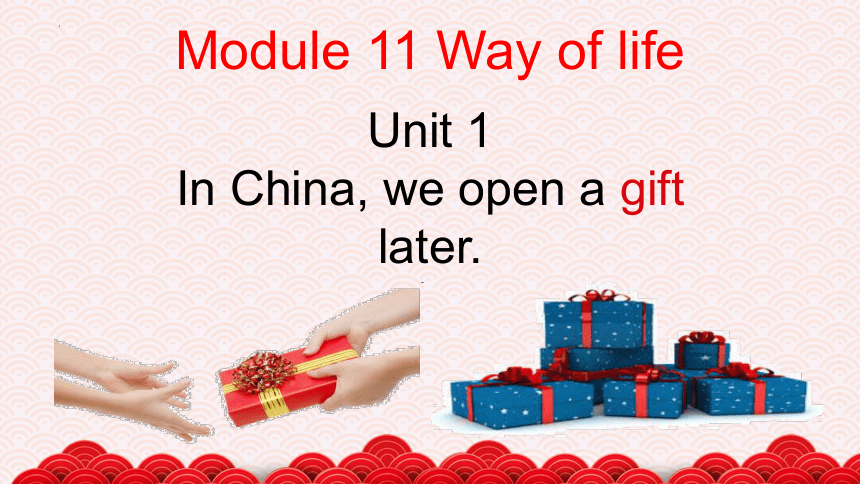 | |
| 格式 | pptx | ||
| 文件大小 | 18.7MB | ||
| 资源类型 | 教案 | ||
| 版本资源 | 外研版 | ||
| 科目 | 英语 | ||
| 更新时间 | 2022-12-27 07:17:54 | ||
图片预览

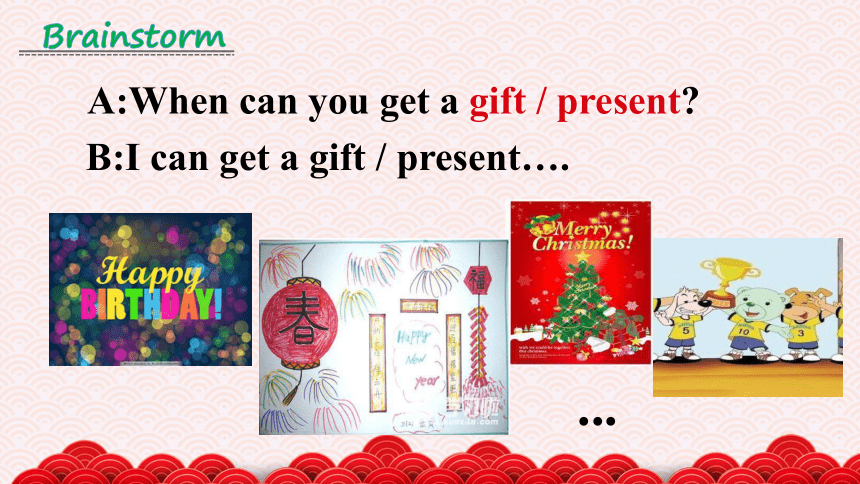
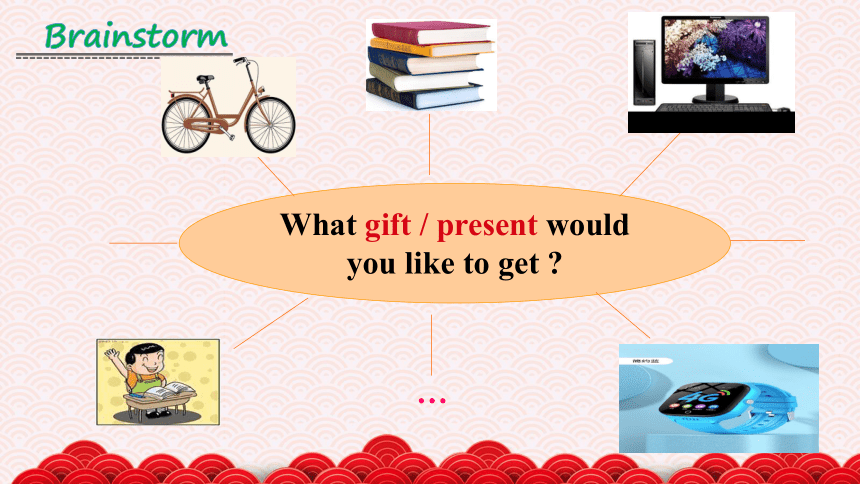
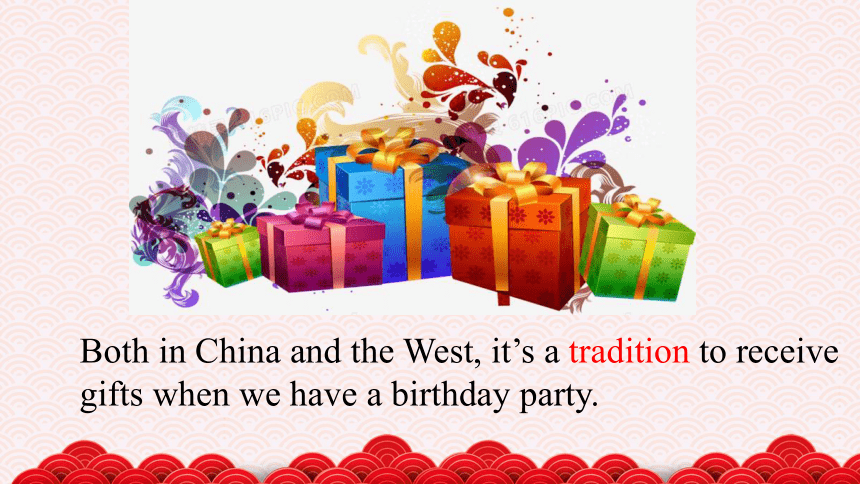
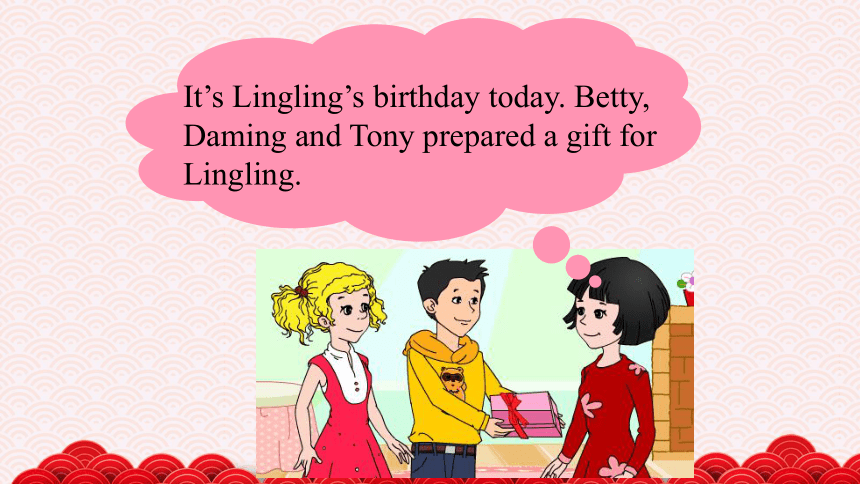
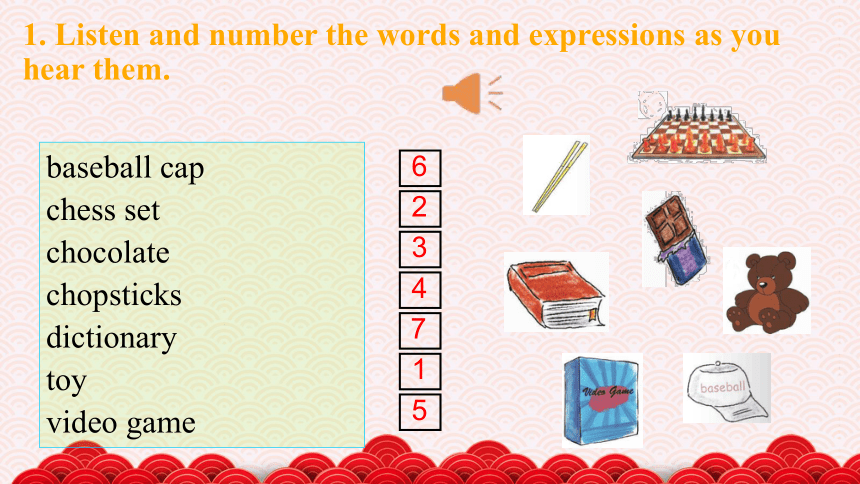
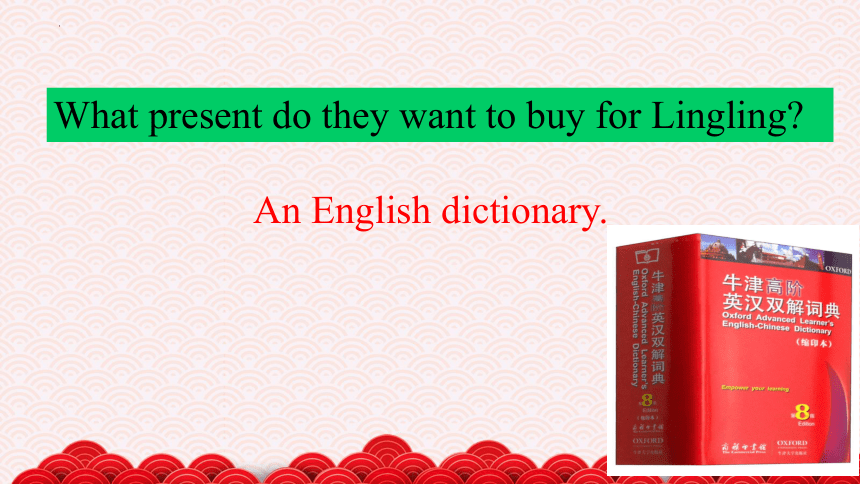
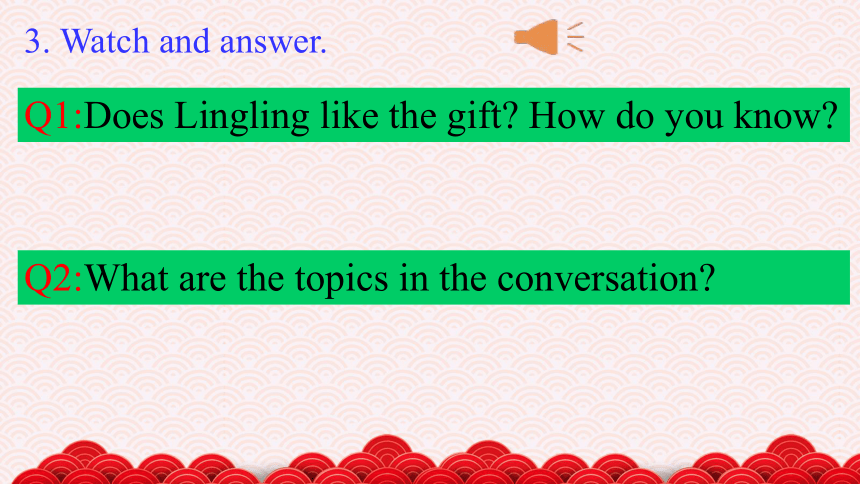
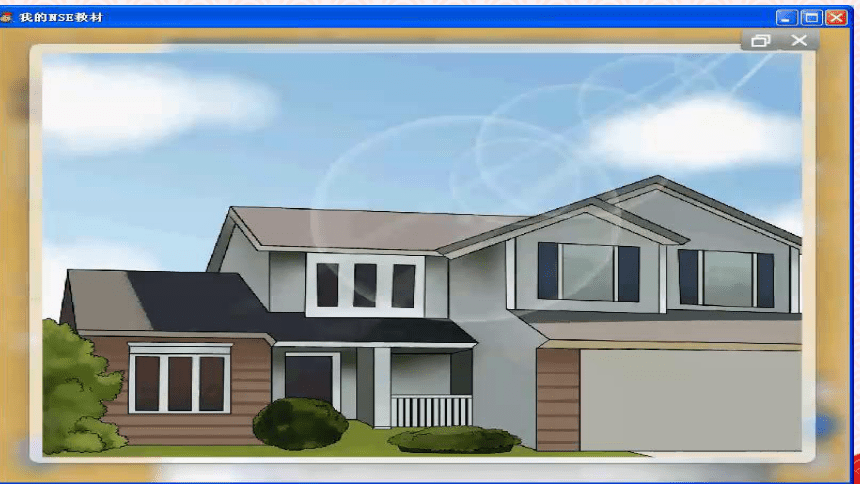
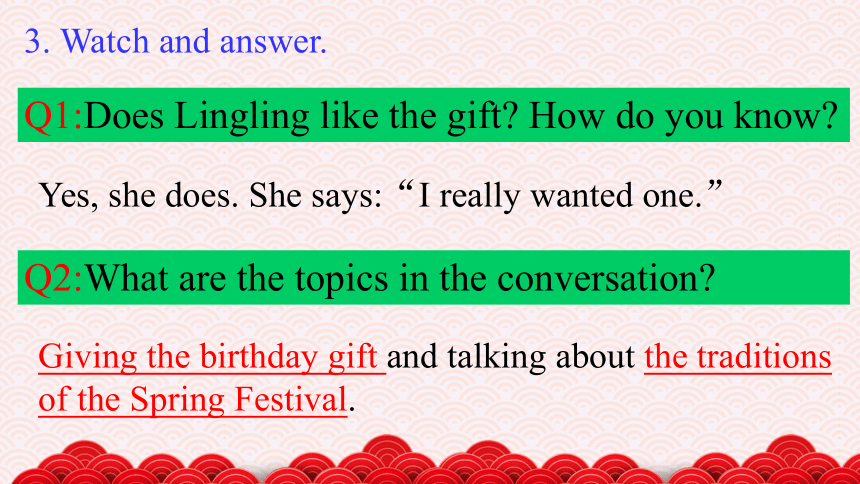
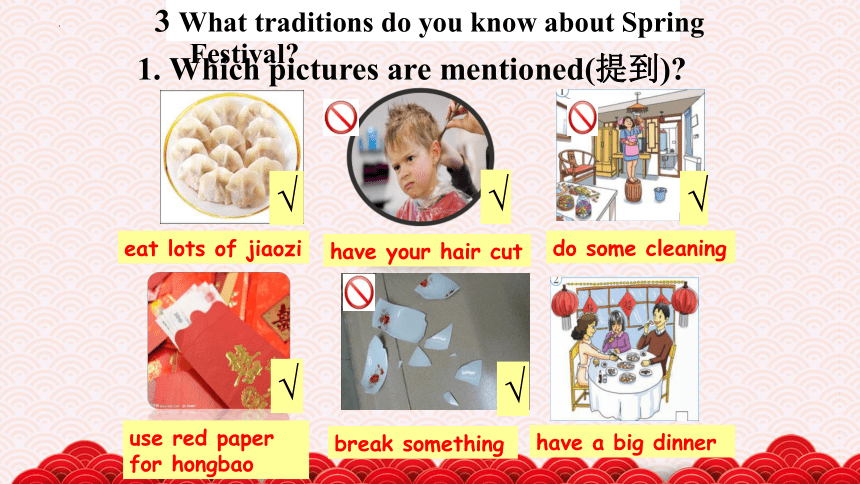
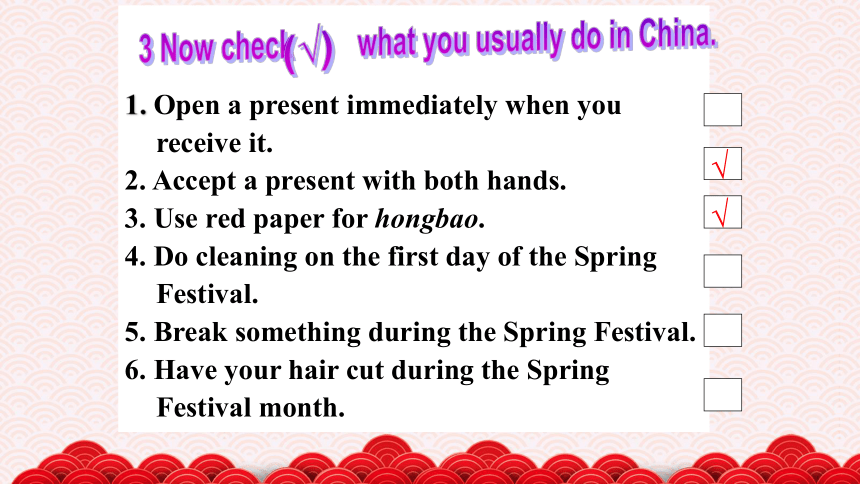
文档简介
(共57张PPT)
Unit 1
In China, we open a gift later.
Module 11 Way of life
Brainstorm
A:When can you get a gift / present
B:I can get a gift / present….
...
What gift / present would you like to get
…
Brainstorm
Both in China and the West, it’s a tradition to receive gifts when we have a birthday party.
It’s Lingling’s birthday today. Betty, Daming and Tony prepared a gift for Lingling.
baseball cap
chess set
chocolate
chopsticks
dictionary
toy
video game
2
5
3
4
1
6
7
1. Listen and number the words and expressions as you hear them.
What present do they want to buy for Lingling
An English dictionary.
3. Watch and answer.
Q1:Does Lingling like the gift How do you know
Q2:What are the topics in the conversation
3. Watch and answer.
Q1:Does Lingling like the gift How do you know
Q2:What are the topics in the conversation
Yes, she does. She says:“I really wanted one.”
Giving the birthday gift and talking about the traditions of the Spring Festival.
1. Which pictures are mentioned(提到)
eat lots of jiaozi
have your hair cut
do some cleaning
use red paper for hongbao
break something
have a big dinner
3 What traditions do you know about Spring Festival
√
√
√
√
√
1. Open a present immediately when you receive it.
2. Accept a present with both hands.
3. Use red paper for hongbao.
4. Do cleaning on the first day of the Spring Festival.
5. Break something during the Spring Festival.
6. Have your hair cut during the Spring Festival month.
√
√
3 Now check what you usually do in China.
(√)
4. Listen for details (the first topic)
gift:_____ In China In the West
later
immediately
with both hands
don't pay much attention
to that
open a gift
accept a gift
different traditions
We should learn to accept and respect different traditions.
When in Rome, do as the Romans do.
In the US, a small gift like a bunch of flowers, a book or a bottle of wine is enough.
a dictionary
Listen for details (the second topic)
What are the Chinese traditions of the Spring Festival
Spring Festival
3. You must only ____________ for Hong bao.
2.You mustn’t ____________.
1.You mustn’t _______________on the first day.
5. In the north of China, people
_______________________.
4. You’d better not _________________ during the Spring Festival month.
eat lots of jiaozi
have your hair cut
break anything
do any cleaning
use red paper
5. Read for the details
How to change to the second topic
Topic 1
Giving the birthday gift
Topic 2
Talking about the traditions of the Spring Festival
I’m more interested to know all the Chinese traditions. Tell me more.
5. Read for the details
How to return to the first topic
Topic 2
Giving the birthday gift
Topic 1
Talking about the traditions of the Spring Festival
Anyway, the Spring Festival is still over a month away.Let’s celebrate Lingling’s birthday first.
Read the dialogue carefully and underline the sentences with modal verbs(情态动词).
can 表示“许可,可以”,
否定形式cannot(can’t)表示“不能,不可以”。
should 表示“应该,将会”,
否定形式should not(shouldn’t)表示“不应该,不应”。
need 作情态动词,表示“需要”,
否定形式need not(needn’t)表示“不需要,不必要”。
must 作情态动词,表示“必须,一定要”,
否定形式must not(mustn’t)表示“不能,禁止”。
had better 表示劝告或建议,意思是“最好”,否定形式had better not。
Language points
Here’s your gift. 这真给你的礼物。
(1) here,there等副词位于句首,引起的倒装句:
① 主语为普通名词:
here+谓语+主语(普通名词)
② 主语为人称代词:
here+人称代词主格+谓语
e.g. A little girl comes here.
She comes here.
Here comes a little girl .
Here she comes.
抄在书上
Here’s your gift. 这真给你的礼物。
(2) gift ① 【C】礼物
birthday gifts/presents 生日礼物
② 【C,U】天赋,才能
have a (great) gift for…
(极)有……的天赋
e.g. Julie has a great gift for music.
Julie is a gifted musician.
gifted/talented
adj.有天赋的
= present
= talent
复习
2. What a surprise! 这真是个惊喜!
(1) surprise
①【C,U】 惊奇,意外之事
e.g. To my surprise, I received a birthday gift from him.
What a surprise!
to one’s surprise
in surprise
令某人惊讶的是
惊讶地,吃惊地
e.g. She looked up in surprise.
抄书上
2. What a surprise! 这真是个惊喜!
(1) surprise
② v. 使(某人)吃惊
e.g. The story surprised us.
③ surprised adj. 感到吃惊的
surprising adj. 令人吃惊的,出人意料的
surprise sb.
e.g. I was _______ at the ________ news.
surprised
surprising
复习
I have a _______ for you!
2) She looked _______and said nothing.
3) What he said _______ all his friends.
4) Everyone said it was a very _______ party.
【语境应用】用surprise的适当形式填空。
surprise
surprised
surprised
surprising
2. What a surprise! 这真是个惊喜!
(2) what 引导的感叹句
① What + a/an +adj. + 【C】sing. (+主语+谓语)!
e.g. What a nice present (it is)!
② What +adj. + 【C】pl. / 【U】 (+主语+谓语)!
e.g. What nice gifts (they are)!
What good news (it is)!
抄笔记上
2. What a surprise! 这真是个惊喜!
(3) how 引导的感叹句
① How +adj. + a/an + 【C】sing. (+主语+谓语)!
e.g. How nice a present (it is)!
② How +adj./adv (+主语+谓语)!
e.g. How nice (these gifts are)!
③ How +主语+谓语!
e.g. How time flies!
抄笔记上
What fine weather it is! =How fine the weather is!
天气真好!
What a beautiful girl she is! =How beautiful the girl is!
她是多么漂亮的一个女孩啊!
What kind women they are!=How kind the women are!
她们是多么善良的女性啊!
How fast Liu Xiang runs!
刘翔跑得多么快啊!
练习
3.I don’t think I should open it now. 我觉得我不应该现在打开它。(think/believe/suppose否定前移)。
我想他是不会来的。
对不起,我想我并不认识你。
但主语不是第一人称时不前移
I don’t believe he’ll come.
I’m sorry, but I don’ t think I know you.
She thinks she can not arrive there on time.
抄书上
immediately是副词,意为“立即;直接地”,在句中作状语,相当于__________________________________________如:
She answered almost immediately. 她几乎立刻就回答了。
Mary answered Peter’s letter immediately. 玛丽立即给彼得回了信。
4.But back in the US, we open a gift immediately. 但是在美国,我们立刻打开礼物。
back
1)n.背部,背 He stood with his back to the door.
at the back (of+n) 在.....后面
2)adj.背后的,后部的 He was sitting in the back row.
3)向后,在背面 Sit back and relax.----反义词
Give my baseball back.
He will be back on Monday.
forward
“at once”或“right now/away”。
抄书上
5.So what do I do 那我怎么办?
so用作连词,其用法如下:
①so用作连词,置于句首,连接前面的句子,意为“那么,这样说来”。如:
So we will catch the 3 o’clock train. 那么我们赶得上3点的火车。
②so用作连词,主要用于表示结果,意为“因此,所以”。如:
The door was locked, so we couldn’t get in. 门锁了,所以我们进不去。
外面天气很冷,所以穿一件暖和的大衣吧。
③so用作连词,有时可与并列连词and连用。如:
He told me to do it and so I did it. 他叫我做那件事,所以我就做了。
他努力工作,所以他取得了成功。
He worked hard and so he succeeded.
It’s very cold outside, so put on a warm coat.
打印到笔记本上
6.You needn’t wait! 你不必等了!
need意为“需要”。它既可用作实义动词,也可以用作情态动词。其用法如下:
①need作情态动词无人称或数的变化, 后接动词原形,多用于否定句和疑问句中,意为“需要;必须”。如:
You needn’t say sorry to me. 你不必向我道歉。
---Need he hand in his homework now 他必须现在交他的作业吗?
--Yes ,he must. No, he needn’t.
打印贴笔记上
②need作实义动词,意为“需要”。有人称和数的变化,后面可接名词、代词、动名词和不定式;可用于肯定句、疑问句和否定句中。
当主语是人时,用(don’t)need to do sth.“需要做某事”或(don’t)need sb. to do sth.“需要某人做某事”;
当主语是物时,用(sth.) need doing/to be done“(某事/物)需要被做”。
她需要你帮助她。
我不需要看病。
We need to learn English quickly. 我们需要快速学英语。
这些树需要浇水了。
---- Do you need to go at once 你需要马上走吗?
I don’t need to see the doctor.
She needs you to help her.
The trees need watering/to be watered.
---- Yes, I do. ---- No, I don’t.
打印贴笔记上
7. I noticed another difference. 我注意到了另一个不同之处。
(4) notice v. 注意到
① notice sb. do sth. 注意到某人做某事(经常做/ 全过程)
② notice sb. doing sth. 注意到某人正在做某事
e.g. I noticed Lily ____ (talk) on her phone when I passed by.
e.g. I noticed Miss Xu ____ (walk) into her office just now.
talking
walk
复习
7. I noticed another difference. 我注意到了另一个不同之处。
(1) difference 【 C,U】差别;差异
① make a/some difference to 对……有/有些作用、影响
② make no difference to 对……没有作用、影响
(2) different adj. 不同的
be different from…
(3) differ v. 不同于;有区别
differ from…
抄笔记本上
【语境应用】完成句子。
1) There are some __________(different) between the two books.
2) American English is __________(different) from British English.
3) American English __________(different) from British English.
4) Changing schools made a big __________(different) to my life.
differences
different
differs
difference
练习
8. In China, you accept a gift with both hands.
在中国,你们用双手接礼物。
(1) accept vt. / vi. 接受;收到
① accept one’s advice 接收某人的建议
② accept one’s invitation 接收某人的邀请
e.g. Please accept this small gift.
They offered me a job and I accepted.
抄书上
(2) accept和receive
e.g. She received a big bunch of roses from him, but she didn’t accept it.
词汇 意思
accept 主观层面的接受
receive 只表示“收到”这一客观事实,主观上是否接受并不确定。
复习
8. In China, you accept a gift with both hands.
介词用:
1)with +a/an/the+cn单 with a smile on the face
with +pl with flowers in his hand
2) in+语言 in French
3) by+cn单 by email
by+doing by listening to the radio
打印笔记上
with的复合结构:
1.with + 宾语(名词,代词) + doing 做宾语补足语
With summer coming, the weather is becoming hotter and hotter.
随着夏天的到来,天气越来越热。
With the teacher standing beside,she felt a bit nervous .
老师站在旁边,她觉得有点紧张。
2.with + 宾语 +宾语补足语(to do/done/adj/adv/介词短语......)
With much work to do, I have to stay at home .
The boy rushed into the room with his face covered with sweat(汗).
With more and more forest damaged(被毁坏),animals are facing danger of dying out(死绝).
With the window open(adj),it is a bit cold.
He left the classroom with all the lights on(adv).
The girl with a bag on her back went to school happily.
打印笔记上
8. In China, you accept a gift with both hands.
both 2个、2个都----neither 2个都不
1,Both(of the) girls are French.
I like them both.=I like both of them .
2.both.....and .....
Both he and she are French.
复习
9.But in the West, we usually don’t pay much attention to that. 但是在西方,我们通常不太注意。
pay attention to 意为“注意;留心;专心;集中注意力”,to后接名词、代词或动词的-ing形式,
Well, pay more attention to it next time. 下次要多注意些。
你应该注意照顾自己。
You should pay attention to looking after yourself.
抄书上
10.I’ m interested to know all the Chinese traditions. 我对知道所有的中国习俗感兴趣。
be interested to do sth. 意为“对做某事感兴趣”,
相当于be interested in doing sth. 如:
我很想听听你的想法。
我对学烹饪感兴趣。
I am interested to hear your idea.
I am interested to learn cooking.
抄书上
all
限定词
1.+the/my/this/that+pl 所有,全部
All horses are animals.// All my plants died.
Cars were coming from all directions(=every direction).
2.+the/my/this/that+un 所有,全部
I have all the hard work. // He lost all his money.
3.+单数名词,表示某时间段内持续发生,意思时全部的,整个的
I worked hard all year.// She was excited all that time .
代词
所有,全部All of the food has gone. //Not all of them are invited.
唯一的,所有的 All I want is peace.
副词 完全=completely She was dress all in white.
He lives all alone. // The coffee went all over my dress.
打印笔记上
11. For example, in my hometown, people say you mustn’t do any cleaning on the first day of the Spring Festival.(m)
比如,在我的家乡,大家都说在大年初一不能大扫除。
词条 意思
such as 列举同类中的几个典型的例子,其后不用逗号与所列举的对象隔开,后接名词或动名词(短语),不接句子。
for example 列举同类中的一个,通常用逗号与所列举的对象隔开,位于句首、句中或句末均可,后可接句子。
复习
【语境应用】用for example, such as完成句子。
1) He knows many languages well, ________Chinese, English and French.
2) To keep healthy, I keep doing sports. ________, I play basketball with my friends every Saturday.
such as
For example
练习
(2) must v. aux (情态动词) 必须
① must后接动词原形
② must not = mustn’t
e.g. Everyone must obey the traffic rules. You mustn’t break them.
禁止,不能,不允许
复习
e.g. ---Must I hand in my report now
---Yes, you ________.
--- No, you ________.
不必
④ Must开头的一般疑问句:
肯定回答:must
否定回答: needn’t/ don’t have to
must
needn’t/ don’t have to
复习
1. must表示主观的义务和必要,主要用于肯定句和疑问句,意思为 “必须……,得……,要……”,
You must go to school on time. 你必须按时上学。
must侧重于说话者的主观看法,认为有必要或有义务去做某事;
have to侧重于客观需要,含有“不得不,被迫”之意。
All passengers must wear seat belts. 所有乘客都要系安全带。
My bike was broken yesterday, so I had to walk to school.
2. must表示肯定的猜测,常用于肯定句中,意为 “一定是,必然……”。
Your sister must be a doctor . 你的妹妹一定是医生。
猜测的词 must,may,might, can’t
复习
do some cleaning 打扫卫生
“do+some+doing”构成的短语:
do some reading阅读;do some washing洗衣服;
do some sightseeing游览观光;do some cooking做饭;
do some fishing钓鱼;do some writing写作;do some shopping购物。
go+doing 运动类
go swimming/hiking/skating.......
复习
break-broke-broken
v.(使)破,碎,裂 The plate broke into pieces.
v.损坏 My watch has broken.
+法律,承诺等 break the rules, break the world record
cn.休息,间隙 have a break
luck un 运气 bad/good luck
adj.幸运的 lucky 反义词 unlucky
adv.幸运地 luckily 反义词 unluckily
复习
12. And you’d better not have your hair cut during the Spring Festival month. 并且正月里最好不要理发。
(1) had better do sth. 最好做……
had better not do sth. 最好不要做……
e.g. You had better go to hospital immediately.
You’d better not be late for class again.
复习
12. And you’d better not have your hair cut during the Spring Festival month. 并且正月里最好不要理发。
(2) have/has/ had +宾语+done 使……被(他人) ……
e.g. I had my bike _________yesterday.
我昨天请人修了我的自行车。
宾补动作常由他人(非主语本身)来完成,有被动意义。
(3) during the Spring Festival month 在正月里
repaired
打印笔记上
13. You can’t be serious!
你不会是认真的吧!/ 你是开玩笑的吧!
(2) serious
① adj. 认真严肃的,不开玩笑的
be serious about (doing) sth. 对(做)……很认真
e.g. Mr Smith is a serious maths teacher.
Is she serious about giving up her study
(1) = Are you joking / You must be joking!
抄写笔记上
(2) serious ② adj.严重的(形容病情或危害等)
make a serious mistake 犯了严重的错误
cause serious injury 导致重伤
(3) seriously adv.严肃地,认真地,严重地
take… seriously 认真/严肃对待…
e.g. From now on, you must take your study seriously.
抄写笔记上
【语境应用】用serious的适当形式填空。
1) Environmental pollution has been a ________
problem and it’s time to give ________ consideration to it.
2) My grandmother was ________ill last week, but she is better now.
serious
serious
seriously
14. They taste great. 它们尝起来很好吃。
(1) taste link v. (系动词)尝起来
e.g. The cake tasted better than it looked.
(2) taste v. 品尝
e.g. He offered me a cup of tea and asked me to taste it.
(3) taste 【 C,U】味道;滋味;一口
e.g. The medicine has a little bitter taste.
(4) taste 【 U】鉴赏力,欣赏力
e.g. He has very good taste in music.
taste + adj.
抄写笔记上
anyway adv
1.而且,反正,加之
It is too expensive and anyway the colour does not suit(合适) you.
2.尽管,即使这样
The water is cold but I took a shower anyway
I am afraid I can not come ,but thanks for the invitation(邀请) anyway.
3.转换话题,结束谈话或回到原话题意思是“不过,总之,反正”
Anyway,let us forget it .
Anyway,I had better go now.
打印笔记上
Unit 1
In China, we open a gift later.
Module 11 Way of life
Brainstorm
A:When can you get a gift / present
B:I can get a gift / present….
...
What gift / present would you like to get
…
Brainstorm
Both in China and the West, it’s a tradition to receive gifts when we have a birthday party.
It’s Lingling’s birthday today. Betty, Daming and Tony prepared a gift for Lingling.
baseball cap
chess set
chocolate
chopsticks
dictionary
toy
video game
2
5
3
4
1
6
7
1. Listen and number the words and expressions as you hear them.
What present do they want to buy for Lingling
An English dictionary.
3. Watch and answer.
Q1:Does Lingling like the gift How do you know
Q2:What are the topics in the conversation
3. Watch and answer.
Q1:Does Lingling like the gift How do you know
Q2:What are the topics in the conversation
Yes, she does. She says:“I really wanted one.”
Giving the birthday gift and talking about the traditions of the Spring Festival.
1. Which pictures are mentioned(提到)
eat lots of jiaozi
have your hair cut
do some cleaning
use red paper for hongbao
break something
have a big dinner
3 What traditions do you know about Spring Festival
√
√
√
√
√
1. Open a present immediately when you receive it.
2. Accept a present with both hands.
3. Use red paper for hongbao.
4. Do cleaning on the first day of the Spring Festival.
5. Break something during the Spring Festival.
6. Have your hair cut during the Spring Festival month.
√
√
3 Now check what you usually do in China.
(√)
4. Listen for details (the first topic)
gift:_____ In China In the West
later
immediately
with both hands
don't pay much attention
to that
open a gift
accept a gift
different traditions
We should learn to accept and respect different traditions.
When in Rome, do as the Romans do.
In the US, a small gift like a bunch of flowers, a book or a bottle of wine is enough.
a dictionary
Listen for details (the second topic)
What are the Chinese traditions of the Spring Festival
Spring Festival
3. You must only ____________ for Hong bao.
2.You mustn’t ____________.
1.You mustn’t _______________on the first day.
5. In the north of China, people
_______________________.
4. You’d better not _________________ during the Spring Festival month.
eat lots of jiaozi
have your hair cut
break anything
do any cleaning
use red paper
5. Read for the details
How to change to the second topic
Topic 1
Giving the birthday gift
Topic 2
Talking about the traditions of the Spring Festival
I’m more interested to know all the Chinese traditions. Tell me more.
5. Read for the details
How to return to the first topic
Topic 2
Giving the birthday gift
Topic 1
Talking about the traditions of the Spring Festival
Anyway, the Spring Festival is still over a month away.Let’s celebrate Lingling’s birthday first.
Read the dialogue carefully and underline the sentences with modal verbs(情态动词).
can 表示“许可,可以”,
否定形式cannot(can’t)表示“不能,不可以”。
should 表示“应该,将会”,
否定形式should not(shouldn’t)表示“不应该,不应”。
need 作情态动词,表示“需要”,
否定形式need not(needn’t)表示“不需要,不必要”。
must 作情态动词,表示“必须,一定要”,
否定形式must not(mustn’t)表示“不能,禁止”。
had better 表示劝告或建议,意思是“最好”,否定形式had better not。
Language points
Here’s your gift. 这真给你的礼物。
(1) here,there等副词位于句首,引起的倒装句:
① 主语为普通名词:
here+谓语+主语(普通名词)
② 主语为人称代词:
here+人称代词主格+谓语
e.g. A little girl comes here.
She comes here.
Here comes a little girl .
Here she comes.
抄在书上
Here’s your gift. 这真给你的礼物。
(2) gift ① 【C】礼物
birthday gifts/presents 生日礼物
② 【C,U】天赋,才能
have a (great) gift for…
(极)有……的天赋
e.g. Julie has a great gift for music.
Julie is a gifted musician.
gifted/talented
adj.有天赋的
= present
= talent
复习
2. What a surprise! 这真是个惊喜!
(1) surprise
①【C,U】 惊奇,意外之事
e.g. To my surprise, I received a birthday gift from him.
What a surprise!
to one’s surprise
in surprise
令某人惊讶的是
惊讶地,吃惊地
e.g. She looked up in surprise.
抄书上
2. What a surprise! 这真是个惊喜!
(1) surprise
② v. 使(某人)吃惊
e.g. The story surprised us.
③ surprised adj. 感到吃惊的
surprising adj. 令人吃惊的,出人意料的
surprise sb.
e.g. I was _______ at the ________ news.
surprised
surprising
复习
I have a _______ for you!
2) She looked _______and said nothing.
3) What he said _______ all his friends.
4) Everyone said it was a very _______ party.
【语境应用】用surprise的适当形式填空。
surprise
surprised
surprised
surprising
2. What a surprise! 这真是个惊喜!
(2) what 引导的感叹句
① What + a/an +adj. + 【C】sing. (+主语+谓语)!
e.g. What a nice present (it is)!
② What +adj. + 【C】pl. / 【U】 (+主语+谓语)!
e.g. What nice gifts (they are)!
What good news (it is)!
抄笔记上
2. What a surprise! 这真是个惊喜!
(3) how 引导的感叹句
① How +adj. + a/an + 【C】sing. (+主语+谓语)!
e.g. How nice a present (it is)!
② How +adj./adv (+主语+谓语)!
e.g. How nice (these gifts are)!
③ How +主语+谓语!
e.g. How time flies!
抄笔记上
What fine weather it is! =How fine the weather is!
天气真好!
What a beautiful girl she is! =How beautiful the girl is!
她是多么漂亮的一个女孩啊!
What kind women they are!=How kind the women are!
她们是多么善良的女性啊!
How fast Liu Xiang runs!
刘翔跑得多么快啊!
练习
3.I don’t think I should open it now. 我觉得我不应该现在打开它。(think/believe/suppose否定前移)。
我想他是不会来的。
对不起,我想我并不认识你。
但主语不是第一人称时不前移
I don’t believe he’ll come.
I’m sorry, but I don’ t think I know you.
She thinks she can not arrive there on time.
抄书上
immediately是副词,意为“立即;直接地”,在句中作状语,相当于__________________________________________如:
She answered almost immediately. 她几乎立刻就回答了。
Mary answered Peter’s letter immediately. 玛丽立即给彼得回了信。
4.But back in the US, we open a gift immediately. 但是在美国,我们立刻打开礼物。
back
1)n.背部,背 He stood with his back to the door.
at the back (of+n) 在.....后面
2)adj.背后的,后部的 He was sitting in the back row.
3)向后,在背面 Sit back and relax.----反义词
Give my baseball back.
He will be back on Monday.
forward
“at once”或“right now/away”。
抄书上
5.So what do I do 那我怎么办?
so用作连词,其用法如下:
①so用作连词,置于句首,连接前面的句子,意为“那么,这样说来”。如:
So we will catch the 3 o’clock train. 那么我们赶得上3点的火车。
②so用作连词,主要用于表示结果,意为“因此,所以”。如:
The door was locked, so we couldn’t get in. 门锁了,所以我们进不去。
外面天气很冷,所以穿一件暖和的大衣吧。
③so用作连词,有时可与并列连词and连用。如:
He told me to do it and so I did it. 他叫我做那件事,所以我就做了。
他努力工作,所以他取得了成功。
He worked hard and so he succeeded.
It’s very cold outside, so put on a warm coat.
打印到笔记本上
6.You needn’t wait! 你不必等了!
need意为“需要”。它既可用作实义动词,也可以用作情态动词。其用法如下:
①need作情态动词无人称或数的变化, 后接动词原形,多用于否定句和疑问句中,意为“需要;必须”。如:
You needn’t say sorry to me. 你不必向我道歉。
---Need he hand in his homework now 他必须现在交他的作业吗?
--Yes ,he must. No, he needn’t.
打印贴笔记上
②need作实义动词,意为“需要”。有人称和数的变化,后面可接名词、代词、动名词和不定式;可用于肯定句、疑问句和否定句中。
当主语是人时,用(don’t)need to do sth.“需要做某事”或(don’t)need sb. to do sth.“需要某人做某事”;
当主语是物时,用(sth.) need doing/to be done“(某事/物)需要被做”。
她需要你帮助她。
我不需要看病。
We need to learn English quickly. 我们需要快速学英语。
这些树需要浇水了。
---- Do you need to go at once 你需要马上走吗?
I don’t need to see the doctor.
She needs you to help her.
The trees need watering/to be watered.
---- Yes, I do. ---- No, I don’t.
打印贴笔记上
7. I noticed another difference. 我注意到了另一个不同之处。
(4) notice v. 注意到
① notice sb. do sth. 注意到某人做某事(经常做/ 全过程)
② notice sb. doing sth. 注意到某人正在做某事
e.g. I noticed Lily ____ (talk) on her phone when I passed by.
e.g. I noticed Miss Xu ____ (walk) into her office just now.
talking
walk
复习
7. I noticed another difference. 我注意到了另一个不同之处。
(1) difference 【 C,U】差别;差异
① make a/some difference to 对……有/有些作用、影响
② make no difference to 对……没有作用、影响
(2) different adj. 不同的
be different from…
(3) differ v. 不同于;有区别
differ from…
抄笔记本上
【语境应用】完成句子。
1) There are some __________(different) between the two books.
2) American English is __________(different) from British English.
3) American English __________(different) from British English.
4) Changing schools made a big __________(different) to my life.
differences
different
differs
difference
练习
8. In China, you accept a gift with both hands.
在中国,你们用双手接礼物。
(1) accept vt. / vi. 接受;收到
① accept one’s advice 接收某人的建议
② accept one’s invitation 接收某人的邀请
e.g. Please accept this small gift.
They offered me a job and I accepted.
抄书上
(2) accept和receive
e.g. She received a big bunch of roses from him, but she didn’t accept it.
词汇 意思
accept 主观层面的接受
receive 只表示“收到”这一客观事实,主观上是否接受并不确定。
复习
8. In China, you accept a gift with both hands.
介词用:
1)with +a/an/the+cn单 with a smile on the face
with +pl with flowers in his hand
2) in+语言 in French
3) by+cn单 by email
by+doing by listening to the radio
打印笔记上
with的复合结构:
1.with + 宾语(名词,代词) + doing 做宾语补足语
With summer coming, the weather is becoming hotter and hotter.
随着夏天的到来,天气越来越热。
With the teacher standing beside,she felt a bit nervous .
老师站在旁边,她觉得有点紧张。
2.with + 宾语 +宾语补足语(to do/done/adj/adv/介词短语......)
With much work to do, I have to stay at home .
The boy rushed into the room with his face covered with sweat(汗).
With more and more forest damaged(被毁坏),animals are facing danger of dying out(死绝).
With the window open(adj),it is a bit cold.
He left the classroom with all the lights on(adv).
The girl with a bag on her back went to school happily.
打印笔记上
8. In China, you accept a gift with both hands.
both 2个、2个都----neither 2个都不
1,Both(of the) girls are French.
I like them both.=I like both of them .
2.both.....and .....
Both he and she are French.
复习
9.But in the West, we usually don’t pay much attention to that. 但是在西方,我们通常不太注意。
pay attention to 意为“注意;留心;专心;集中注意力”,to后接名词、代词或动词的-ing形式,
Well, pay more attention to it next time. 下次要多注意些。
你应该注意照顾自己。
You should pay attention to looking after yourself.
抄书上
10.I’ m interested to know all the Chinese traditions. 我对知道所有的中国习俗感兴趣。
be interested to do sth. 意为“对做某事感兴趣”,
相当于be interested in doing sth. 如:
我很想听听你的想法。
我对学烹饪感兴趣。
I am interested to hear your idea.
I am interested to learn cooking.
抄书上
all
限定词
1.+the/my/this/that+pl 所有,全部
All horses are animals.// All my plants died.
Cars were coming from all directions(=every direction).
2.+the/my/this/that+un 所有,全部
I have all the hard work. // He lost all his money.
3.+单数名词,表示某时间段内持续发生,意思时全部的,整个的
I worked hard all year.// She was excited all that time .
代词
所有,全部All of the food has gone. //Not all of them are invited.
唯一的,所有的 All I want is peace.
副词 完全=completely She was dress all in white.
He lives all alone. // The coffee went all over my dress.
打印笔记上
11. For example, in my hometown, people say you mustn’t do any cleaning on the first day of the Spring Festival.(m)
比如,在我的家乡,大家都说在大年初一不能大扫除。
词条 意思
such as 列举同类中的几个典型的例子,其后不用逗号与所列举的对象隔开,后接名词或动名词(短语),不接句子。
for example 列举同类中的一个,通常用逗号与所列举的对象隔开,位于句首、句中或句末均可,后可接句子。
复习
【语境应用】用for example, such as完成句子。
1) He knows many languages well, ________Chinese, English and French.
2) To keep healthy, I keep doing sports. ________, I play basketball with my friends every Saturday.
such as
For example
练习
(2) must v. aux (情态动词) 必须
① must后接动词原形
② must not = mustn’t
e.g. Everyone must obey the traffic rules. You mustn’t break them.
禁止,不能,不允许
复习
e.g. ---Must I hand in my report now
---Yes, you ________.
--- No, you ________.
不必
④ Must开头的一般疑问句:
肯定回答:must
否定回答: needn’t/ don’t have to
must
needn’t/ don’t have to
复习
1. must表示主观的义务和必要,主要用于肯定句和疑问句,意思为 “必须……,得……,要……”,
You must go to school on time. 你必须按时上学。
must侧重于说话者的主观看法,认为有必要或有义务去做某事;
have to侧重于客观需要,含有“不得不,被迫”之意。
All passengers must wear seat belts. 所有乘客都要系安全带。
My bike was broken yesterday, so I had to walk to school.
2. must表示肯定的猜测,常用于肯定句中,意为 “一定是,必然……”。
Your sister must be a doctor . 你的妹妹一定是医生。
猜测的词 must,may,might, can’t
复习
do some cleaning 打扫卫生
“do+some+doing”构成的短语:
do some reading阅读;do some washing洗衣服;
do some sightseeing游览观光;do some cooking做饭;
do some fishing钓鱼;do some writing写作;do some shopping购物。
go+doing 运动类
go swimming/hiking/skating.......
复习
break-broke-broken
v.(使)破,碎,裂 The plate broke into pieces.
v.损坏 My watch has broken.
+法律,承诺等 break the rules, break the world record
cn.休息,间隙 have a break
luck un 运气 bad/good luck
adj.幸运的 lucky 反义词 unlucky
adv.幸运地 luckily 反义词 unluckily
复习
12. And you’d better not have your hair cut during the Spring Festival month. 并且正月里最好不要理发。
(1) had better do sth. 最好做……
had better not do sth. 最好不要做……
e.g. You had better go to hospital immediately.
You’d better not be late for class again.
复习
12. And you’d better not have your hair cut during the Spring Festival month. 并且正月里最好不要理发。
(2) have/has/ had +宾语+done 使……被(他人) ……
e.g. I had my bike _________yesterday.
我昨天请人修了我的自行车。
宾补动作常由他人(非主语本身)来完成,有被动意义。
(3) during the Spring Festival month 在正月里
repaired
打印笔记上
13. You can’t be serious!
你不会是认真的吧!/ 你是开玩笑的吧!
(2) serious
① adj. 认真严肃的,不开玩笑的
be serious about (doing) sth. 对(做)……很认真
e.g. Mr Smith is a serious maths teacher.
Is she serious about giving up her study
(1) = Are you joking / You must be joking!
抄写笔记上
(2) serious ② adj.严重的(形容病情或危害等)
make a serious mistake 犯了严重的错误
cause serious injury 导致重伤
(3) seriously adv.严肃地,认真地,严重地
take… seriously 认真/严肃对待…
e.g. From now on, you must take your study seriously.
抄写笔记上
【语境应用】用serious的适当形式填空。
1) Environmental pollution has been a ________
problem and it’s time to give ________ consideration to it.
2) My grandmother was ________ill last week, but she is better now.
serious
serious
seriously
14. They taste great. 它们尝起来很好吃。
(1) taste link v. (系动词)尝起来
e.g. The cake tasted better than it looked.
(2) taste v. 品尝
e.g. He offered me a cup of tea and asked me to taste it.
(3) taste 【 C,U】味道;滋味;一口
e.g. The medicine has a little bitter taste.
(4) taste 【 U】鉴赏力,欣赏力
e.g. He has very good taste in music.
taste + adj.
抄写笔记上
anyway adv
1.而且,反正,加之
It is too expensive and anyway the colour does not suit(合适) you.
2.尽管,即使这样
The water is cold but I took a shower anyway
I am afraid I can not come ,but thanks for the invitation(邀请) anyway.
3.转换话题,结束谈话或回到原话题意思是“不过,总之,反正”
Anyway,let us forget it .
Anyway,I had better go now.
打印笔记上
同课章节目录
- Module 1 How to learn English
- Unit 1 Let's try to speak English as much as possi
- Unit 2 You should smile at her.
- Unit 3 Language in use .
- Module 2 My home town and my country
- Unit 1 It's taller than many other buildings.
- Unit 2 Cambridge is a beautiful city in the east o
- Unit 3 Language in use .
- Module 3 Sports.
- Unit 1 Nothing is more exciting than playing tenni
- Unit 2 This year we training more carefully.
- Unit 3 Language in use .
- Module 4 Planes, ships and trains .
- Unit 1 He lives the farthest from school.
- Unit 2 What is the best way to travel.
- Unit 3 Language in use .
- Module 5 Lao She Teahouse.
- Unit 1 I wanted to see the Beijing Opera.
- Unit 2 It descibes the changes in Chinese society.
- Unit 3 Language in use .
- Module 6 Animals in danger.
- Unit 1 It allows people to get closer to them .
- Unit 2 The WWF is working hard to save them all.
- Unit 3 Language in use .
- Revision module A
- Module 7 A famous story
- Unit 1 Alice was sitting with her sister by the ri
- Unit 2 She was thinking about her cat.
- Unit 3 Language in use .
- Module 8 Accidents
- Unit 1 While the car were changing to red, a car s
- Unit 2 I was trying to pick it up when it bite me
- Unit 3 Language in use .
- Module 9 Population
- Unit 1 The population of China is about 1.37 billi
- Unit 2 Arnwick was a city with 200,000 people.
- Unit 3 Language in use .
- Module 10 The weathe
- Unit 1 It might snow.
- Unit 2 The weather is fine all year round.
- Unit 3 Language in use .
- Module 11 Way of life
- Unit 1 In China ,we open a gift later.
- Unit 2 In England, you usually drink tea with milk
- Unit 3 Language in use .
- Module 12 Help
- Unit 1 What should we do before help arrives?
- Unit 2 Stay away from windows and heavy furniture.
- Unit 3 Language in use .
- Revision module B
